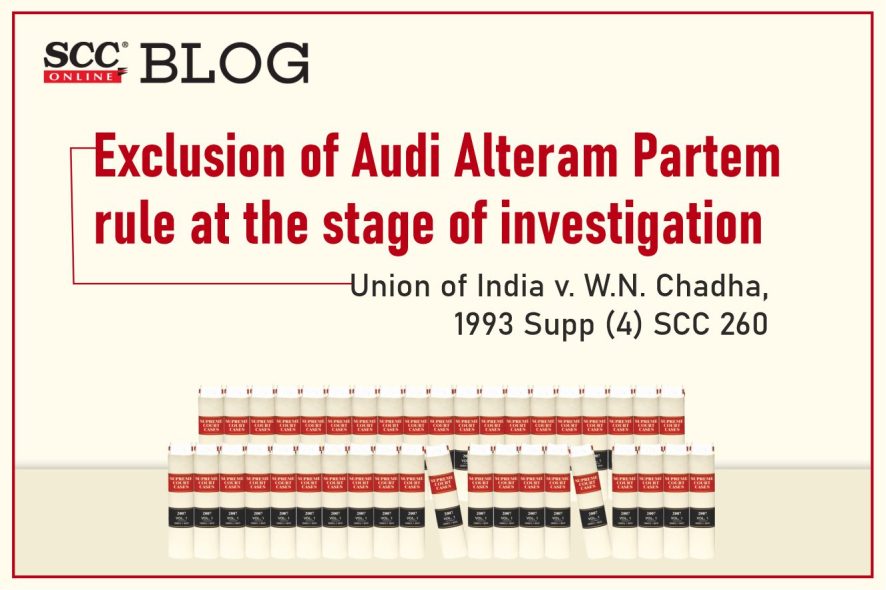In Union of India v. W.N. Chadha,1993 Supp (4) SCC 260, the bench of S. Ratnavel Pandian and K. Jayachandra Reddy, JJ explained the exclusion of the application of the principle of audi alteram partem in relation to an accused at the stage of investigation and made the following observation:
“81. There is exclusion of the application of audi alteram partem rule to cases where nothing unfair can be inferred by not affording an opportunity to present and meet a case. This rule cannot be applied to defeat the ends of justice or to make the law “lifeless, absurd, stultifying and self-defeating or plainly contrary to the common sense of the situation” and this rule may be jettisoned in very exceptional circumstances where compulsive necessity so demands.
89. Applying the above principle, it may be held that when the investigating officer is not deciding any matter except collecting the materials for ascertaining whether a prima facie case is made out or not and a full enquiry in case of filing a report under Section 173(2) follows in a trial before the Court or Tribunal pursuant to the filing of the report, it cannot be said that at that stage rule of audi alteram partem superimposes an obligation to issue a prior notice and hear the accused which the statute does not expressly recognise. The question is not whether audi alteram partem is implicit, but whether the occasion for its attraction exists at all.
90. Under the scheme of Chapter XII of the Code of Criminal Procedure, there are various provisions under which no prior notice or opportunity of being heard is conferred as a matter of course to an accused person while the proceeding is in the stage of an investigation by a police officer.
91. More so, the accused has no right to have any say as regards the manner and method of investigation. Save under certain exceptions under the entire scheme of the Code, the accused has no participation as a matter of right during the course of the investigation of a case instituted on a police report till the investigation culminates in filing of a final report under Section 173(2) of the Code or in a proceeding instituted otherwise than on a police report till the process is issued under Section 204 of the Code, as the case may be. Even in cases where cognizance of an offence is taken on a complaint notwithstanding that the said offence is triable by a Magistrate or triable exclusively by the Court of Sessions, the accused has no right to have participation till the process is issued. In case the issue of process is postponed as contemplated under Section 202 of the Code, the accused may attend the subsequent inquiry but cannot participate. There are various judicial pronouncements to this effect but we feel that it is not necessary to recapitulate those decisions. At the same time, we would like to point out that there are certain provisions under the Code empowering the Magistrate to give an opportunity of being heard under certain specified circumstances.”







